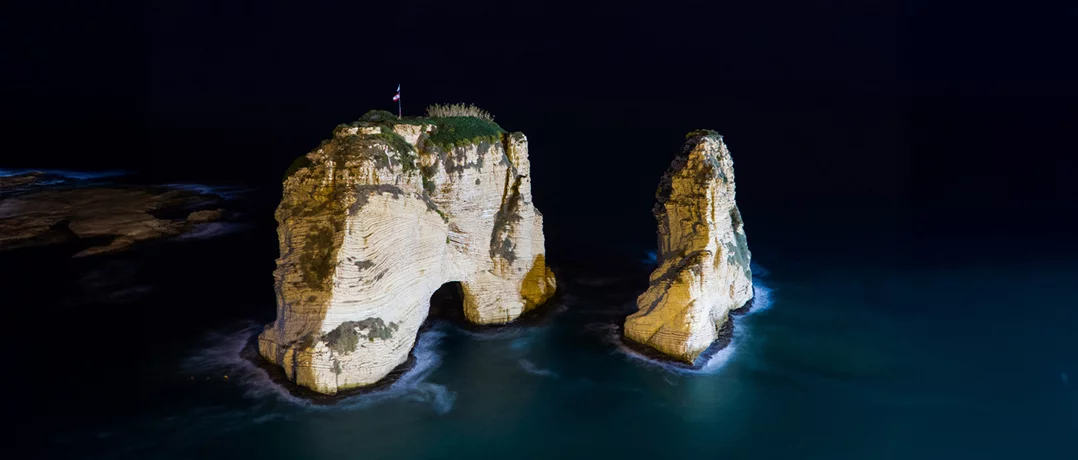Hezbollah’s recent show of force at Beirut’s Raouché Rock underscores Lebanon’s deepening political instability and the erosion of state authority.
Raouché Rock replaces Jerusalem.. A quiet “Coup” in Beirut
Raouché Rock replaces Jerusalem.. A quiet “Coup” in Beirut


Political divisions once again grip Lebanon over one of its most contentious issues, Hezbollah’s weapons. In the past two days, the events surrounding “Raouché Rock” have marked a turning point that can be described as a quiet “coup”, seemingly orchestrated by Hezbollah in coordination with senior state officials and institutions.
The developments unfolded as Hezbollah held a commemoration opposite “Raouché Rock” for its late secretary-general Hassan Nasrallah, killed in the war with Israel. Weapons appeared openly among some participants - on motorcycles and on boats circling the site - and were later displayed even more clearly during a significant rally in Beirut’s southern suburbs on Saturday.
The scene suggested that Prime Minister Nawaf Salam stood alone among senior leaders, trying to confront what he considered a direct breach of state sovereignty and an existential threat to its institutions. As internal tensions escalate, the international environment remains equally perilous. Washington and other major capitals are signaling clearly that Lebanon stands on the brink of a new confrontation.
What happened at “Raouché Rock” was no longer a simple violation of an administrative order; it was a sign that the “coup” had reached an advanced stage - one in which de facto powers align with state officials who are supposed to defend the state. Security agencies failed to enforce government decisions, and the Defense Ministry issued a statement whose wording suggested that the state, through the prime minister, was itself seeking internal conflict.
The streets.. and assassinations
As Hezbollah members paraded through Beirut’s streets, some circled near Nawaf Salam’s residence in Ras Beirut. Security forces arrived more than an hour later, far too late to prevent what was clearly an intimidation attempt. Soon after, a similar scene unfolded outside the home of MP Marwan Hamadeh, where Hezbollah loyalists gathered and threatened him - again without security protection.
This was more than bureaucratic negligence; it raised fears of complicity in the “coup” and delivered a direct message undermining state authority.
In just one week, Hezbollah shifted its rhetoric from the once-vaunted “liberation of Jerusalem” to the symbolic “liberation of Raouché Rock”, imposing its will over a historic landmark in the heart of Beirut. As one observer in Paris put it, “the battle is no longer about a prime minister - it is a threat to the very meaning of the state”.
Reports from Washington indicated that U.S. officials handling the Lebanon file were fully aware of the details of the “Raouché Rock” events. They conveyed their displeasure to Lebanese officials, warning against this “coup”.
Then came remarks from Hezbollah MP Hassan Fadlallah, reopening questions about the party’s infiltration of state institutions. Having inherited the Syrian regime’s former role in appointing senior officials, Hezbollah has embedded loyalists within the state - partners in this “coup”. Fadlallah added a surprising revelation, before his election, President Joseph Aoun had pledged to accommodate Hezbollah during this stage and to apply UN Resolution 1701 only south of the Litani River, not across all Lebanese territory.
This situation, compounded by state institutions’ failure to protect Lebanon’s internal order, prompted Washington to reconsider its military assistance, including a proposed additional $190 million for the Lebanese Armed Forces. The aid is now linked to the government’s stalled plan to restrict weapons to state control, with the October 5 cabinet session expected to serve as a test of institutional commitment.
Recent developments have raised sharp questions about Lebanon’s future. Will Hezbollah, after this “coup”, move to consolidate complete control over state institutions? Scenarios include reigniting the streets with provocative motorcycle rallies, storming neighborhoods in Beirut and beyond, attacking the homes of officials and opponents, or even reviving an assassination campaign reminiscent of 2004, when Marwan Hamadeh survived an attempt on his life and former Prime Minister Rafic Hariri and others were later killed.
International Signals
Lebanon’s crisis is not escaping international attention. U.S. envoy Tom Barrack emphasized that the government must fulfill its responsibilities, underlining Washington’s dissatisfaction with senior officials who argue that progress on the weapons issue cannot come quickly.
Most notable in recent days has been Lebanon's international absence, despite the presence of its highest-ranking officials at the United Nations. The Lebanese delegation did not meet with US President Donald Trump or his French counterpart, Emmanuel Macron, despite France's intense interest in the Lebanese situation. Remarkably, Lebanon was "absent" from Trump's meeting on the Gaza plan, a clear indication that Lebanon has not yet embarked on the path to international recovery due to its failure to address the issues of weapons and corruption.
Adding to the pressure, discussions have emerged about relocating an international donor conference for the Lebanese army from Paris to Riyadh, with no date set. The message is clear, foreign support is now explicitly conditional on implementing a weapons-control plan. Diplomatic sources in multiple capitals stressed that aid must be tied to Lebanon’s adherence to the logic of the state and its institutions.
Following the “Raouché Rock” episode, foreign expectations that Lebanon will resolve its weapons crisis have dropped dramatically. The likelihood of escalation, both internal and external, has grown. Observers warn of a new Hezbollah gamble that could reignite war with Israel, especially after its open display of arms in Beirut and the southern suburbs.
The latest events mark a dangerous inflection point, an explicit declaration of a “coup”, coupled with internal escalation that threatens the state and directly undermines the authority of its security and military institutions. As tensions mount, the international landscape is equally ominous, with unmistakable signals from Washington and other capitals indicating that Lebanon stands on the edge of a new escalation-one that would require urgent political settlements, which, for now, do not exist.

